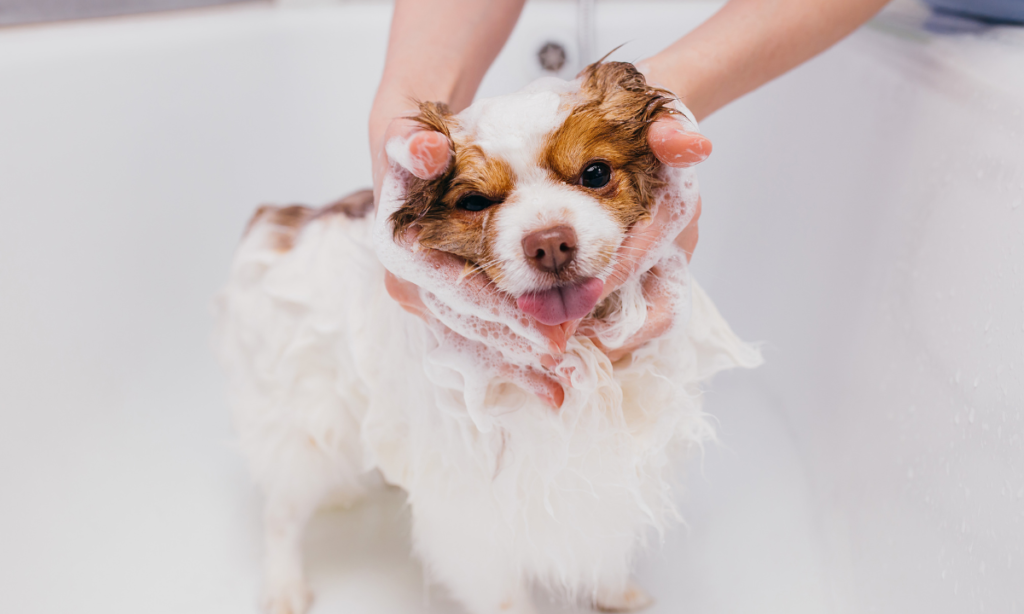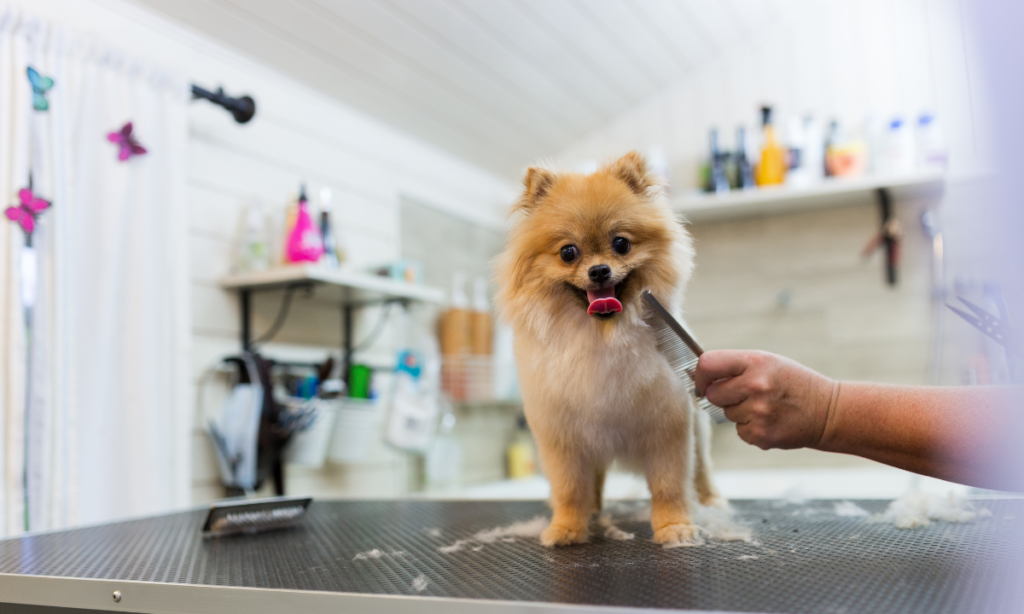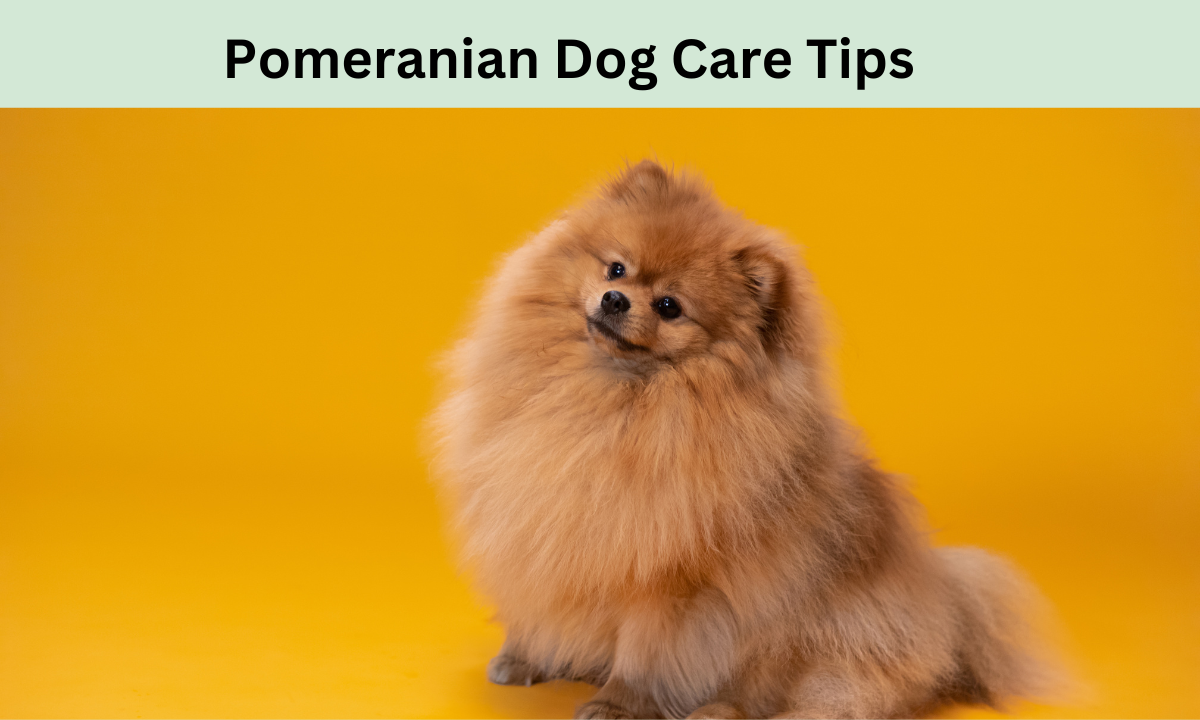Pomeranians are one of the most popular dog toy breeds. They are small, cute, and energetic balls of fur. However, as owners, we must be careful in caring for their needs. This article provides tips on Pomeranian care, covering aspects like feeding, exercise, grooming, and health. These Pomeranian Dog Care Tips will help us keep our beloved Pomeranian happy and healthy for many years.
Tips for Taking Care of Your Pomeranian Dog

Here are a few tips that can help you take care of your Pomeranian Dog:
Feeding
Pomeranians have small stomachs, so feed them 2-3 times daily in small portions. Go for puppy- or small-breed-specific food that is easy to digest. Ensure the food contains enough proteins, vitamins, and minerals for their growth and energy needs. Check food labels for ingredients and calories. Always keep clean water available. Overfeeding or underfeeding can lead to digestive or skin issues.
Exercise
Pomeranians may be small, but they are very active dogs. They need at least 30 minutes of playtime daily to burn their energy and stay fit. Play fetch, toss toys, or play in a yard to get them moving. Make activities fun, so they enjoy it. Older Poms also need gentle exercise like short walks. Lack of exercise can result in behavioral problems. Overall, aim for 30-60 minutes per day.
Grooming
Their thick double coat needs frequent brushing to prevent matting. Brush at least twice a week, paying attention to hard-to-reach areas. Bathing is required only when dirty, followed by thorough drying. Trim nails as needed, usually every four weeks. Check ears weekly for wax build-up and clean if required. Brush teeth twice a week to prevent dental issues. Proper grooming prevents skin problems and keeps their coat shiny.
Healthcare
Take Poms for annual checkups and vaccinations. Check eyes regularly for discharge or redness, which may indicate infections. Monitor weight and check for lumps or bumps on the skin. They are prone to dental disease as toy breeds, so feed them dental chews or brush them daily. Also, watch for reverse sneezing, which may seem scary but is usually harmless. Overall, keep healthcare routine to spot any issues early.
Housetraining
Start housetraining pups when they are young by taking them out frequently after meals, play, and waking up. Use the same spot every time and praise for going there. Clean any accidents thoroughly with enzymatic cleaner so the smell is removed. Crate training helps as pups do not like soiling in their sleeping area. Be patient, as it takes time. Consistency in routine and positive reinforcement is key. Praise and small treats for going outdoors will help train them quickly.
Traveling with Poms
Being small, Poms love traveling with their owners. However, ensure safety by following guidelines. Never let them roam freely in the car; always secure them in pet carriers or harnesses. Prepare a traveling bag with food, water, play toys, bed, waste bags, and medications. Vaccinate and get a health certificate as required. Socialize them to new environments like cars and hotels from a young age. Carry them when out amid crowds or reckless areas. Provide extra loving care during travel to reduce stress.
Top Things You Should Stop Doing With Your Pom Dog

Here are our top don’t tips for your pom Dogs:
Stop Feeding human foods
While sharing table scraps may seem like a fun treat, feeding human food to a puppy can be harmful. Their digestive systems are very sensitive; some human foods can cause upset stomachs, diarrhea, or other issues. Stick to a high-quality, age-appropriate pet food designed for puppies. It provides them with balanced nutrition for growth. Occasional safe human foods that can be given in small pieces are cooked plain meat, peanut butter, or carrots. However, avoid spicy, fatty, sugary, or salty human foods, which can negatively impact their health.
Stop Using retractable leashes.
While using a retractable leash seems convenient for exercise, they are not appropriate for puppies or recommended by experts. Puppies can easily be hurt if another animal yanks the leash or if they bolt unexpectedly. It also prevents you from having control during training sessions. Stick to standard 6-foot leashes until a puppy is well-behaved and older. Their safety should always come first.
Stop Leaving your puppy alone for long periods.
Pomeranian puppies should not be left alone for over 4-5 hours as they can easily get distressed. While at work or away for long periods of time, it’s best to hire a professional dog walker or send them to doggy daycare for mental stimulation, safe play, and bathroom breaks. Not meeting their social and physical needs can lead to behavioral issues like excessive barking or separation anxiety. Prioritize being home as much as possible.
Stop Yelling when they misbehave
Yelling and scolding will not teach a puppy what they did wrong and often just serves to scare or stress them out further. It is better to respond firmly with a calm “no” or “ah-ah” sound, then redirect to a permitted behavior. Praise lavishly when they obey. Puppies will be less likely to repeat mistakes if they understand desired vs undesirable actions. Harsh tones risk unintentionally conditioning mistrust or damaging the relationship between owner and animal.
Conclusion
By following these simple care and feeding Pomeranian dog care tips and by stop doing certain things, Pomeranians can stay happy and healthy for many years, bringing us loads of joy, love, and laughter. Make vet visits, nutrition, exercise, grooming, and healthcare a priority in your routine. With proper care, Poms can live 12-16 years. Most importantly, give them plenty of affection and quality time to strengthen your bond. That’s the key to a long, blissful life with your furry Pom friend.
Frequently Asked Questions (FAQs)
Q1. How much should I feed my Pom?
A: Poms have small stomachs. Adults need 1/4 to 1/2 cups of food daily divided into 2-3 meals. Read labels carefully and adjust portions based on your Pom’s size, age, and activity level. Overfeeding can cause obesity.
Q2. How do I train my Pom?
A: Be patient and consistent with positive reinforcement training. Start with basic commands like sit and stay using treats and praise. Keep sessions short. Socialize pups young and avoid harsh punishments, which can damage trust. Potty train with consistency and rewards outside only.
Q3. When should I groom my Pom?
A: Grooming is a vital part of care. Brush coat 2-3 times a week, more during shedding season. Trim nails every four weeks. Check ears and clean them if needed weekly. Bath only when truly dirty. Professional grooming every 4-6 weeks helps remove mats and dead hair. Brush teeth 2-3 times a week.
Q4. How do I know if my Pom is happy and healthy?
A: Signs of a content Pom include bright eyes, a clean coat, appetite, and energy for play. Make vet visits yearly for checkups. Watch for weight changes, behavior changes, sore spots, or wounds on the skin. Any red flags require vet consultation, as proper medical care helps Poms thrive in joy, longevity, and quality of life.
Also read:
- Best Ideas For Dog Food Storage 2024
- The Best Dog Food for German Shorthaired Pointers
- Best Dog Food for Golden Retrievers


